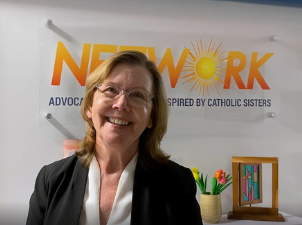
A New Social Fabric
We Must Heed the Warning Signs and Save Our Democracy
Mary J. Novak
October 6, 2022
Turbulent times can take a toll on our imagination. As our politics grow ever more volatile and extreme, we interpret events through the lens of our total experience and assume that, sooner or later, events will settle back into our notion of “normal.”
This is a faulty view. If the last several years have taught us anything, it’s that our imaginations are not prepared for what might come next. And as the midterm elections rapidly approach, this warning is especially urgent.
Last January, my faith and public life colleagues in Washington held their annual retreat, and we had the privilege of hearing a presentation by Dr. Rachel Kleinfeld, senior fellow for the Democracy, Conflict and Governance Program at Carnegie Endowment for International Peace. She clarified that, while we in the U.S. often credit ourselves with being the world’s oldest democracy, we in fact started as a fairly limited democracy – we did not incorporate our Black community – and have only tried to be an inclusive democracy for 60 years, with the passage of the Voting Rights Act of 1965. Sadly, this also marked the point at which our political parties began sorting racially, a process that has continued to present day.
But what Dr. Kleinfeld shared next was more disturbing: When identity aligns with party, it increases political instability: “When more than one identity marker lines up, it actually increases chances of civil war by 12 times.” And in the U.S. our major parties are divided by geography (rural vs. urban), religion, and a host of other things.
The U.S. is among the most polarized countries in the world. People who are trained to see and understand democracies and civil wars across the globe, who study the data on civil wars, were not surprised by what happened on Jan. 6 of last year. They agree that the U.S. has high risk factors for civil war or significant harm to our democracy.
Dr. Kleinfeld explained: “Globally, four factors really elevate risk of election violence: competitive elections that decide balance of power, parties divided by identity, election rules that allow you to win by calling on identity because of how districts are drawn, and a security sector that leans to one side.”
We in the U.S. have all four. We also have alarming upward trends of actual violence against public officials, the politicization and extremism of law enforcement and military (1 in 10 rioters on Jan. 6 had service backgrounds), and the skyrocketing of new gun sales. We also have nearly two thirds of state and federal offices being sought by Republicans who do not fully accept the outcome of the 2020 presidential election.
In many Catholic churches, however, we can find people of all races and identities under the same roof. These are the kinds of places where peacebuilding can happen, where we can create the conditions for building the understanding we need to turn away from this downward spiral. As we look back on the Jan. 6 Committee hearings and all the violence of recent months, I hope we can all agree that we need to pay attention and start reaching out to those who do not agree with us on every issue.
Dr. Kleinfeld left us with this: “Hope, family, connection: A country rent by dissension must see, feel, and touch how it might come together. Families pulled apart by politics, conspiracy, disagreements over COVID, must find a way back to one another. Social fabric must be darned and re-sewn in a stronger tapestry.”
To help actualize this, churches can lead the way by saying no to violence of any type. Dr. Kleinfeld also called for the subordination of politics below religion, rather than making power into a religion unto itself. These are especially powerful admonitions as we enter into what may be the most consequential U.S. election since the Civil War.
We should also employ our imaginations to envision how the future can be profoundly more just and given to human flourishing, one that is vastly better for all than the old status quo we somehow accepted. At NETWORK, we keep this vision before us in the work we do, and especially as we approach this election. As followers of Jesus and collaborators with the Spirit, we walk in hope. We envision a new, inclusive social fabric, one that is ever durable and resplendently vibrant.







